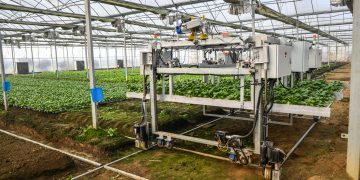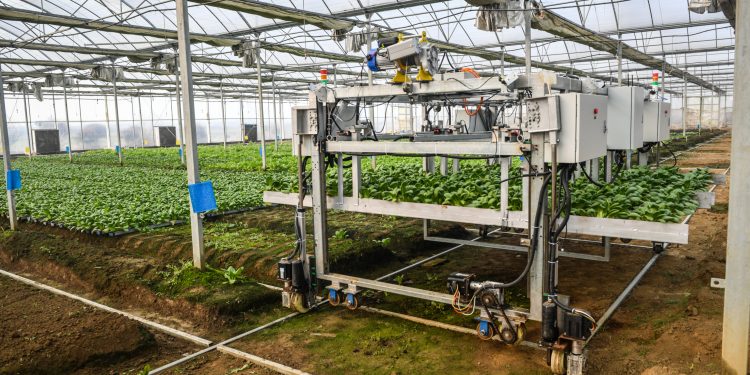#Agriculture #VegetableFarming #Mechanization #QualityEnhancement #SustainableAgriculture #AgriculturalInnovation #Nanjing #CropYield #LaborEfficiency
In the heart of Nanjing’s agricultural landscape lies a beacon of innovation: the vegetable production base of Nanjing Rongxin Agricultural Technology Co., Ltd., resembles a miniature “vegetable factory,” where crops like Shanghai green thrive in cultivation troughs.
“We have largely achieved mechanization throughout the vegetable cultivation and harvesting process, with a daily production of 15,000 to 20,000 kilograms of vegetables. Previously, this would require at least 100 workers, but now only 5 are needed,” remarked Yan Shaohua, Chief Expert Consultant at Nanjing Rongxin Agricultural Technology Co., Ltd. This production method not only saves labor but also boosts yields. Taking Shanghai green as an example, one mu (approximately 0.067 hectares) yields between 8,000 to 10,000 kilograms per crop, with 5 to 6 crops annually, resulting in a total yield of 35,000 to 50,000 kilograms.
Vegetable farming has long been characterized by labor intensity, facing challenges such as labor shortages, high labor costs, and an aging workforce. “Compared to cash crops, vegetables have higher added value. However, in modern metropolises like Nanjing, the labor costs of vegetable production remain prohibitively high, accounting for over 50% of total production costs, hindering the industry’s further development,” explained a representative from the Municipal Agriculture and Rural Affairs Bureau.
In response, Nanjing has identified mechanization and informatization as key drivers of vegetable industry development. The city has issued the “Nanjing Municipal (Facility) Vegetable Production Mechanization Development Three-Year Action Plan (2022-2024),” aiming to address the mechanization equipment gaps in key stages of vegetable production within three years. This plan includes the establishment of over 30 vegetable production mechanization demonstration bases and two pilot areas for the promotion and application of agricultural machinery in vegetable production in hilly regions.
The vegetable industry epitomizes one of Nanjing’s eight agricultural advantage characteristic industries, showcasing the city’s efforts to strengthen supply chains and promote industry extension and innovation. Over the past three years, the city’s agricultural and rural departments have identified eight major chains, along with the development directions and three-year goals for each chain. Through structural adjustments and addressing deficiencies, Nanjing has facilitated the aggregation and clustering of advantageous industries, effectively allocating resources and enhancing market competitiveness. Taking the vegetable industry as an example, in 2023, Nanjing successfully established 10 new equipment application demonstration bases for vegetable supply assurance, with the mechanization level of each base exceeding 70%, resulting in a cost reduction of approximately 15% per mu.
The transition from increasing yield to improving quality marks a significant milestone in the evolution of agriculture. Nanjing’s embrace of mechanization in vegetable farming not only addresses labor challenges but also enhances productivity and sustainability. By strategically leveraging technological advancements, the city is paving the way for a more efficient, resilient, and prosperous agricultural sector.































